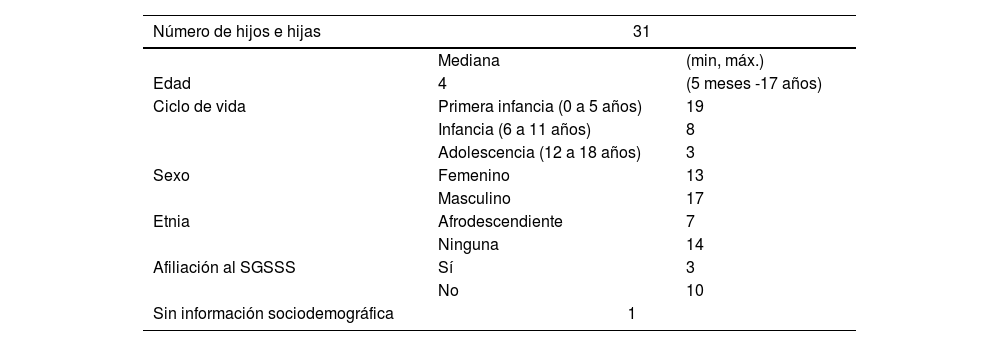Las mujeres en situación de prostitución (MSP) tienen repercusiones negativas en su salud, especialmente en salud física y sexual. No hay muchos estudios sobre las repercusiones en salud mental (SM), ni en población migrante o en sus hijos. Este estudio describe las condiciones de SM de un grupo de MSP migrantes y sus hijos, acompañado de una revisión breve de la literatura.
MetodologíaParticiparon 24 MSP, venezolanas migrantes en Colombia, y sus 31 hijos. Se realizó entrevista psiquiátrica, además de tamización para depresión (PHQ-9), ansiedad (GAD-7), estrés postraumático (PCL-5), bienestar (WHO-5) y desempeño cognoscitivo (MoCA). También se realizó un análisis cualitativo de sus narrativas.
ResultadosEl 89% de las MSP tenían ≥1 trastorno mental, con tamización positiva para GAD-7 (95%), PHQ-9 (79%) y PCL-5 (63%). Su MoCA puntuó bajo en un 63% de ellas. Muchas tuvieron eventos traumáticos antes y durante la prostitución, además de múltiples vulnerabilidades biopsicosociales en su historia de vida. Sus hijos tenían con frecuencia problemas de hiperactividad, conducta, lenguaje y desarrollo de habilidades, además de deficiente vínculo materno y desescolarización. Los estudios disponibles en SM de MSP tienen resultados similares a los nuestros.
ConclusiónEl impacto en SM para MSP y sus hijos no se incluye sistemáticamente en la investigación y la práctica. Los determinantes sociales y factores de riesgo biopsicosociales previos a la prostitución deben considerarse a nivel estructural para reducir la vulnerabilidad a ser víctimas de trata o explotación, así como las consecuencias individuales y familiares.
Women in prostitution (WiP) have negative repercussions on their health, with many reports on physical and sexual health. Neither there are many studies on their mental health (MH) outcomes, nor do they include migrant women and their children. We aimed to describe the MH status of a group of migrant WiP and their children, and to conduct a brief literature review.
Methods24 WiP and their 31 children were evaluated, they were Venezuelan and migrated to Colombia. A psychiatric interview was carried out, in addition to screenings for depression (PHQ-9), anxiety (GAD-7), post-traumatic stress disorder (PCL-5), well-being (WHO-5) and cognitive performance (MoCA). A qualitative analysis of their narratives was also performed.
Results89% of WiP had ≥1 mental disorder, with positive screenings for GAD-7 (95%), PHQ-9 (79%) and PCL-5 (63%). Their MoCA scored lower than expected in 63% of them. Most had witnessed or suffered from emotionally disturbing events before and during prostitution, besides multiple biopsychosocial risk factors in their life history. Their children commonly had hyperactivity and conduct problems, language and developmental delay, poor maternal attachment, and lack of schooling. Available reports about MH in WiP and their children are like ours.
ConclusionThe MH impact for WiP and their children is often not included systematically in research and practice. Social determinants and biopsychosocial risk factors prior to prostitution should be considered at a structural level as they could reduce vulnerability to being victims of trafficking or exploitation, as well as its individual and familial consequences.








